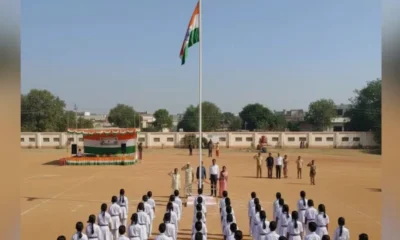[vc_row][vc_column][vc_column_text]Known for his rabid sectarian views, BJP MP Vinay Katiyar on Wednesday, Feb 7 said Muslims should leave India and go to Pakistan or Bangladesh.
The statement is an outright violation of laws against hate speech (See below), but Katiyar and several other lawmakers, including a few ministers in Union government, have regularly got away with such acts without facing any consequences – except the outcomes they desired.
Katiyar also blamed Muslims for partition and demanded strict punishment for those who don’t respect Vande Mataram or the Indian flag.
His comments came in the backdrop of the call of Asaduddin Owaisi, the leader of All India Majlis-e-Ittehadul Muslimeen (AIMIM), for a law that punishes anyone who calls an Indian Muslim a “Pakistani” with a three-year jail term. News 18 quoted Owaisi as saying that Muslims in India are made to feel like outsiders despite having rejected Mohammad Ali Jinnah’s two-nation theory during the formation of Pakistan.
“Muslims should not stay in this country,” Katiyar said, “They have partitioned the country on the basis of population. So why are they here? Muslims have been given their share. They should go to Bangladesh or Pakistan… they have no business being in India.”
“Doosri baat ye hai, Musalman iss desh mein rehna hi nahi chahye, unhone jansankhya ke aadhaar par desh ka batwara kardia toh iss desh mein rehne ki kya avashyakta thi? Unko alag bhu-bhaag de dia gaya, Bangladesh ya Pakistan jaayen yahan kya kaam hai unka? (Secondly, Muslims should not be living in this country, they’ve been given another nation on the basis of population so what is the need for them to live here? They’ve been given another piece of land, Bangladesh or Pakistan, then what are they doing here),” he said.[/vc_column_text][/vc_column][/vc_row][vc_row][vc_column][vc_raw_html]JTNDYmxvY2txdW90ZSUyMGNsYXNzJTNEJTIydHdpdHRlci10d2VldCUyMiUyMGRhdGEtbGFuZyUzRCUyMmVuJTIyJTNFJTNDcCUyMGxhbmclM0QlMjJoaSUyMiUyMGRpciUzRCUyMmx0ciUyMiUzRURvb3NyaSUyMGJhYXQlMjB5ZSUyMGhhaSUyQyUyME11c2FsbWFuJTIwaXNzJTIwZGVzaCUyMG1laW4lMjByZWhuYSUyMGhpJTIwbmFoaSUyMGNoYWh5ZSUyQyUyMHVuaG9uZSUyMGphbnNhbmtoeWElMjBrZSUyMGFhZGhhYXIlMjBwYXIlMjBkZXNoJTIwa2ElMjBiYXR3YXJhJTIwa2FyZGlhJTIwdG9oJTIwaXNzJTIwZGVzaCUyMG1laW4lMjByZWhuZSUyMGtpJTIwa3lhJTIwYXZhc2h5YWt0YSUyMHRoaSUzRiUyMFVua28lMjBhbGFnJTIwYmh1LWJoYWFnJTIwZGUlMjBkaWElMjBnYXlhJTJDJTIwQmFuZ2xhZGVzaCUyMHlhJTIwUGFraXN0YW4lMjBqYWF5ZW4lMjB5YWhhbiUyMGt5YSUyMGthYW0lMjBoYWklMjB1bmthJTNGJTIwJTNBJTIwQkpQJTIwTVAlMjBWaW5heSUyMEthdGl5YXIlMjAlM0NhJTIwaHJlZiUzRCUyMmh0dHBzJTNBJTJGJTJGdC5jbyUyRlZYTXc2clN4OVglMjIlM0VwaWMudHdpdHRlci5jb20lMkZWWE13NnJTeDlYJTNDJTJGYSUzRSUzQyUyRnAlM0UlMjZtZGFzaCUzQiUyMEFOSSUyMCUyOCU0MEFOSSUyOSUyMCUzQ2ElMjBocmVmJTNEJTIyaHR0cHMlM0ElMkYlMkZ0d2l0dGVyLmNvbSUyRkFOSSUyRnN0YXR1cyUyRjk2MTEwNzY4MjEzNTU1MjAwMiUzRnJlZl9zcmMlM0R0d3NyYyUyNTVFdGZ3JTIyJTNFRmVicnVhcnklMjA3JTJDJTIwMjAxOCUzQyUyRmElM0UlM0MlMkZibG9ja3F1b3RlJTNFJTBBJTNDc2NyaXB0JTIwYXN5bmMlMjBzcmMlM0QlMjJodHRwcyUzQSUyRiUyRnBsYXRmb3JtLnR3aXR0ZXIuY29tJTJGd2lkZ2V0cy5qcyUyMiUyMGNoYXJzZXQlM0QlMjJ1dGYtOCUyMiUzRSUzQyUyRnNjcmlwdCUzRSUwQQ==[/vc_raw_html][/vc_column][/vc_row][vc_row][vc_column][vc_column_text]He also demanded that a new law be framed in parliament that would punish those “who do not respect Vande Mataram, (and) those who insult the national flag, or hoist the Pakistani flag.”
“There should be a bill that punishes those who do not respect Vande Matram, those who insult the national flag… those who hoist the Pakistani flag, they should be punished,” ANI quoted BJP MP Vinay Katiyar as saying.
Last week, Katiyar had blamed “pro-Pakistan” elements for the recent violence in Kasganj to avenge the death of a 22-year-old man during the Republic Day celebrations. “These people killed our worker…. They (Muslims) started it and the government is taking strict action against them. It needs to take stricter action,” he had said.
In fact, the violence in Kasganj had started after a bike rally under the name of ‘Tiranga Yatra’ disrupted Republic Day celebrations in a Muslim dominated locality when they were hoisting the tri-colour.
Owaisi dismissed Katiyar’s comments. “Now what can we say? His tenure is about to end… a candle flares up when it comes to an end.”
Just a couple of days ago, Katiyar had said that the Taj Mahal in Agra will soon become ‘Tej Mandir’. When asked about the ‘Taj Mahostav’ being held in Agra, the MP told ANI, “Call it Taj Mahotsav or Tej Mahotsav both are the same things. There is not much difference between Taj and Tej. Our Tej Mandir has been turned into a cremation ground by Aurangzeb. Taj Mahal will be converted into Tej Mandir soon and you will see how this happens.”
Earlier, he had said that Jama Masjid was originally ‘Jamuna Devi mandir’.
Laws against Hate Speech:
Indian Penal Code (IPC) Section 295(A)
Section 295(A) Whoever, with deliberate and malicious intention of outraging the religious feelings of any class of [citizens of India], [by words, either spoken or written, or by signs or by visible representations or otherwise], insults or attempts to insult the religion or the religious beliefs of that class, shall be punished with imprisonment of either description for a term which may extend to [three years], or with fine, or with both.
Indian Penal Code (IPC) Section 153A
Section 153A. Promoting enmity between different groups on grounds of religion, race, place of birth, residence, language, etc., and doing acts prejudicial to maintenance of harmony.—
(1) Whoever –
(a) by words, either spoken or written, or by signs or by visible representations or otherwise, promotes or attempts to promote, on grounds of religion, race, place of birth, residence, language, caste or community or any other ground whatsoever, disharmony or feelings of enmity, hatred or ill-will between different religious, racial, language or regional groups or castes or communities, or
(b) commits any act which is prejudicial to the maintenance of harmony between different religious, racial, language or regional groups or castes or communities, and which disturbs or is likely to disturb the public tranquillity, 2[or] 2[(c) organizes any exercise, movement, drill or other similar activity intending that the participants in such activity shall use or be trained to use criminal force or violence or knowing it to be likely that the participants in such activity will use or be trained to use criminal force or violence, or participates in such activity intending to use or be trained to use criminal force or violence or knowing it to be likely that the participants in such activity will use or be trained to use criminal force or violence, against any religious, racial, language or regional group or caste or community and such activity for any reason whatsoever causes or is likely to cause fear or alarm or a feeling of insecurity amongst members of such religious, racial, language or regional group or caste or community,] shall be punished with imprisonment which may extend to three years, or with fine, or with both. Offence committed in place of worship, etc. – (2) Whoever commits an offence specified in sub-section (1) in any place of worship or in any assembly engaged in the performance of religious worship or religious ceremonies, shall be punished with imprisonment which may extend to five years and shall also be liable to fine.
Indian Penal Code (IPC) Section 153B
153B. Imputations, assertions prejudicial to national-integration. –
(1) Whoever, by words either spoken or written or by signs or by visible representations or otherwise,—
(a) makes or publishes any imputation that any class of persons cannot, by reason of their being members of any religious, racial, language or regional group or caste or community, bear true faith and allegiance to the Constitution of India as by law established or uphold the sovereignty and integrity of India, or
(b) asserts, counsels, advises, propagates or publishes that any class of persons shall, by reason of their being members of any religious, racial, language or regional group or caste or community, be denied or deprived of their rights as citizens of India, or
(c) makes or publishes any assertion, counsel, plea or appeal concerning the obligation of any class of persons, by reason of their being members of any religious, racial, language or regional group or caste or community, and such assertion, counsel, plea or appeal causes or is likely to cause disharmony or feelings of enmity or hatred or ill-will between such members and other persons, shall be punished with imprisonment which may extend to three years, or with fine, or with both.
(2) Whoever commits an offence specified in sub-section (1), in any place of worship or in any assembly engaged in the performance of religious worship or religious ceremonies, shall be punished with imprisonment which may extend to five years and shall also be liable to fine.[/vc_column_text][/vc_column][/vc_row]


 India News2 hours ago
India News2 hours ago
 LATEST SPORTS NEWS1 hour ago
LATEST SPORTS NEWS1 hour ago
 India News1 hour ago
India News1 hour ago
 India News1 hour ago
India News1 hour ago












